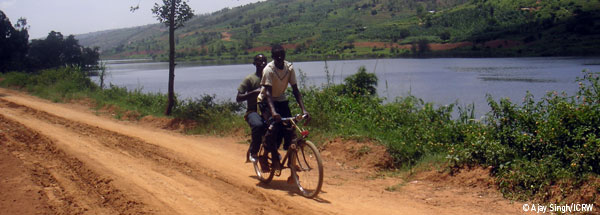
A sale for survival
05 January 2011
Media Contact
On my last trip to Rwanda, I assisted the Rwanda Men’s Resource Centre, a local nongovernmental organization, in implementing the International Men and Gender Equality Survey (IMAGES) among men and women ages 18 to 59. I helped the organization adapt the original survey to reflect a Rwandan context and trained about 80 data collectors. As part of the training we also visited a village in the Gasabo District near the capital Kigali, to pre-test our survey instrument. When we arrived, I saw children playing in tattered clothes amidst mud houses, some with roofs made of bamboo, others with walls made of plastic sheets. This particular village was one of the worst affected by the 1994 genocide, when close to 800,000 people were brutally killed.
Twenty data collectors fanned out across the village to conduct interviews. Later that day, one of them shared with me a horrifying experience during her interview with a woman. The incident she described stays with me even today, long after my return.
The woman was around 35 years old and was home alone at the time of the interview. While she agreed to participate, the interviewer could sense her distraction and anxiousness, as her eyes darted to the front door and back every few minutes. When the interviewer asked her why she was so restless, she said that she was waiting for a visitor. When she pressed more, the Rwandan woman shared that the awaited visitor was a potential buyer for her child.
Needless to say, the interviewer was shocked. The woman, however, spoke matter-of-factly; she remained calm and had no visible emotions on her face. After a while, a man in his late 40s came to the house. The woman excused herself from the interview for a few minutes, and directed him to a room inside the small house. The interviewer could hear their conversation; she told me it sounded like they were negotiating rates. They emerged ten minutes later, a 2-year-old boy wailing in the man’s arms, and the woman smiling at a deal gone well. She waved to the boy as if he was going out to play for a few hours. Once they left, the woman sat down to resume the interview. She smiled when she shared with the interviewer that she received 1,180,000 Rwandan francs, or about $200, for her fifth son.
Goose bumps sprouted all over my body when the data collector told me about the experience. At first, my colleagues and I refused to believe it. How could a mother sell her own son? And how, in doing so, could she be so relaxed and happy?
The woman told the interviewer that, quite simply, it was a common practice in her community, and when it comes to survival and basic needs, one had to do what one had to do. This was unbelievable to me; it was difficult to hold back my tears and shock.
But this is what it is. Poverty at its extreme.
And that thought led to another: Am I doing enough? Am I making a difference where it matters?

